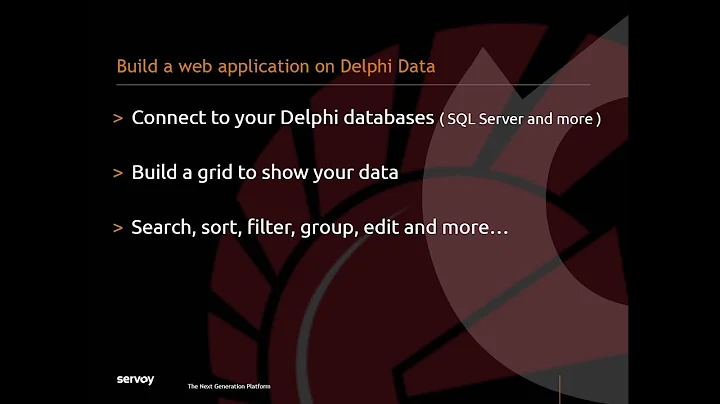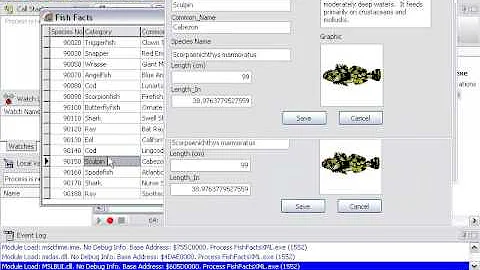Sharing data array between two applications in Delphi
Solution 1
Scratched my head thinking of what a short-but-complete example of sharing memory between two applications might be. The only option is a console application, GUI applications require a minimum of 3 files (DPR + PAS + DFM). So I cooked up a small example where one integers array is shared using a memory mapped file (backed by the page file so I don't need to have a phisical file on disk for this to work). The console application responds to 3 commands:
- EXIT
- SET NUM VALUE Changes the value at index NUM in the array to VALUE
- DUMP NUM displays the value in the array at index NUM
- DUMP ALL displays the whole array
Of course, the command processing code takes up about 80% of the whole application. To test this compile the following console application, find the executable and start it twice. Go to the first window and enter:
SET 1 100
SET 2 50
Go to the second console and enter this:
DUMP 1
DUMP 2
DUMP 3
SET 1 150
Go to the first console and enter this:
DUMP 1
There you have it, you've just witnessed sharing memory between two applications.
program Project2;
{$APPTYPE CONSOLE}
uses
SysUtils, Windows, Classes;
type
TSharedArray = array[0..10] of Integer;
PSharedArray = ^TSharedArray;
var
hFileMapping: THandle; // Mapping handle obtained using CreateFileMapping
SharedArray: PSharedArray; // Pointer to the shared array
cmd, s: string;
num, value, i: Integer;
L_CMD: TStringList;
function ReadNextCommand: string;
begin
WriteLn('Please enter command (one of EXIT, SET NUM VALUE, DUMP NUM, DUMP ALL)');
WriteLn;
ReadLn(Result);
end;
begin
try
hFileMapping := CreateFileMapping(0, nil, PAGE_READWRITE, 0, SizeOf(TSharedArray), '{C616DDE6-23E2-425C-B871-9E0DA54D96DF}');
if hFileMapping = 0 then
RaiseLastOSError
else
try
SharedArray := MapViewOfFile(hFileMapping, FILE_MAP_READ or FILE_MAP_WRITE, 0, 0, SizeOf(TSharedArray));
if SharedArray = nil then
RaiseLastOSError
else
try
WriteLn('Connected to the shared view of the file.');
cmd := ReadNextCommand;
while UpperCase(cmd) <> 'EXIT' do
begin
L_CMD := TStringList.Create;
try
L_CMD.DelimitedText := cmd;
for i:=0 to L_CMD.Count-1 do
L_CMD[i] := UpperCase(L_CMD[i]);
if (L_CMD.Count = 2) and (L_CMD[0] = 'DUMP') and TryStrToInt(L_CMD[1], num) then
WriteLn('SharedArray[', num, ']=', SharedArray^[num])
else if (L_CMD.Count = 2) and (L_CMD[0] = 'DUMP') and (L_CMD[1] = 'ALL') then
begin
for i:= Low(SharedArray^) to High(SharedArray^) do
WriteLn('SharedArray[', i, ']=', SharedArray^[i]);
end
else if (L_CMD.Count = 3) and (L_CMD[0] = 'SET') and TryStrToInt(L_CMD[1], num) and TryStrToInt(L_CMD[2], value) then
begin
SharedArray^[num] := Value;
WriteLn('SharedArray[', num, ']=', SharedArray^[num]);
end
else
WriteLn('Error processing command: ' + cmd);
finally L_CMD.Free;
end;
// Requst next command
cmd := ReadNextCommand;
end;
finally UnmapViewOfFile(SharedArray);
end;
finally CloseHandle(hFileMapping);
end;
except
on E: Exception do
Writeln(E.ClassName, ': ', E.Message);
end;
end.
Solution 2
A Named File Mapping would be the easiest solution, here is some short example code. In this sample there is a main program that writes some data and reader(s) that only read from it.
Main:
type
TSharedData = record
Handle: THandle;
end;
PSharedData = ^TSharedData;
const
BUF_SIZE = 256;
var
SharedData: PSharedData;
hFileMapping: THandle; // Don't forget to close when you're done
function CreateNamedFileMapping(const Name: String): THandle;
begin
Result := CreateFileMapping(INVALID_HANDLE_VALUE, nil, PAGE_READWRITE, 0,
BUF_SIZE, PChar(Name));
Win32Check(Result > 0);
SharedData := MapViewOfFile(Result, FILE_MAP_ALL_ACCESS, 0, 0, BUF_SIZE);
Win32Check(Assigned(SharedData));
end;
procedure TForm1.Button1Click(Sender: TObject);
begin
hFileMapping := CreateNamedFileMapping('MySharedMemory');
Win32Check(hFileMapping > 0);
SharedData^.Handle := CreateHiddenWindow;
end;
reader:
var
hMapFile: THandle; // Don't forget to close
function GetSharedData: PSharedData;
begin
hMapFile := OpenFileMapping(FILE_MAP_ALL_ACCESS, False, 'MySharedMemory');
Win32Check(hMapFile > 0);
Result := MapViewOfFile(hMapFile, FILE_MAP_ALL_ACCESS, 0, 0, BUF_SIZE);
Win32Check(Assigned(Result));
end;
Related videos on Youtube
user
Updated on May 28, 2020Comments
-
user almost 4 years
I want to share array data between two applications. In my mind, first program create the array and the second program can read the array from already allocated memory area. The array is not a dynamic array.
I found a way to share pointer using
OpenFileMappingandMapViewOfFile. I have no luck to implement array sharing and I think i don't want to use IPC method yet.Is it possible to plan a scheme like this (sharing array)? My purpose is to minimize memory usage and reading data quickly.
-
Cosmin Prund about 13 yearsWhat have you tried and how it failed? Because that's precisely how you do it, both applications map a view of the same file so they're both working with the same memory. What's in your array?
-
-
user about 13 years@Cosmin, Why I can't show all items using looping? It shows many 0. `for j := low(SharedArray^) to high(SharedArray^) do WriteLn(SharedArray^[j]);'. I need to match a specific data with the array. I just tried looping, I hope the shared arary can work with binary search.
-
Cosmin Prund about 13 yearsThe shared block of memory is nothing magic, it's just a shared block of memory. You can implement whatever algorithm you want using it. It shows lots of zeros because the block of memory is zero-initialized.
-
user about 13 yearsCosmin, I tried to show all items but I see ^only^ lots of zeros.
-
Cosmin Prund about 13 yearsYou are leaking handles: the handle returned by
CreateFileMappingis only assigned to a local variable inTForm1.Button1Clickso there's no way to close it. This is not required:ZeroMemory(SharedData, BUF_SIZE);- File mappings backed by the page file are (thankfully) zero-initialized. It would be a security threat if that memory was not zero-initialized! -
Cosmin Prund about 13 yearsDid you compile my program? Did you issue the "SET 1 2" command? You'll only get ZEROes unless you write something else yourself.
-
Cosmin Prund about 13 yearsAn other possible issue: You need to keep at least one instance of the program running to maintain the data in memory. The moment the last instance of the shared memory is closed, all data is lost. If you start the application again, it gets a fresh zero-filled buffer. If want to be able to stop the program you need to use memory mapped files backed by real files on disk.
-
user about 13 yearsI did compile your program and I did fill the array. The instances of both program are still running. First I ran the both of program then I issued the "SET 1 2" command in first program. Second program can access the array by using "DUMP" but I can not show all items. I am trying OpenFileMapping instead of CreateFileMapping in second program.
-
user about 13 yearsSame result using OpenFileMapping.
-
Cosmin Prund about 13 yearsI don't understand what you're doing. I did not provide a command for dumping the whole array, so I assume you're doing something else (not using my program). After issuing
set 1 2, issuingdump 1should display the value2. It should not matter if you dodump 1from the same instance or from the other instance, the result should be the same. -
 Remko about 13 years@Cosmin Prund: thanks for the hint about zero init (I didn't know that). Regarding the handle, yes you are right (and this is for the reader as well).
Remko about 13 years@Cosmin Prund: thanks for the hint about zero init (I didn't know that). Regarding the handle, yes you are right (and this is for the reader as well). -
user about 13 yearsI've modified the second program to add "DIR" command. else if Copy(cmd, 1, 3) = 'DIR' then begin for j := low(SharedArray^) to high(SharedArray^) do WriteLn(SharedArray^[j]); end;. All I got is lots of zeros.
-
user about 13 yearsOkay I can do a trick.
set 1 33 is the size of array then I dump the whole array with for j := 2 to (SharedArray^[1])+1 do WriteLn(SharedArray^[j]); . I can do this because in my case I know the size of my array. -
Cosmin Prund about 13 yearsI've edited my answer to streamline command processing and provide a
DUMP ALLcommand to show the whole array. I reduced the size of the array to[0..10]to makeDUMP ALLmanageable (this is only a sample after all). I have no idea why your way doesn't work because I can't see your code, I can only see mine. And mine works. If possible copy-paste your modified code to a pastebin and I'll take a look at it. -
user about 13 yearsI don't know if I am missing something. Your code works! Mine not pastebin.com/00m7WVqj
-
Cosmin Prund about 13 years@user, your code also works. Try this
SET 1024 1024followed byDIR. Since you kept the[0..1024]array, the last printed line will show1024. (I actually copy-pasted, compiled and tested your code) -
user about 13 yearsYes thanks. But why 'High(SharedArray^)' is 1024? A memory block? Why I try
SET 1025 1025thenDIR, there is nothing inSharedArray^[1025]? This is confusing me. -
user about 13 yearsI mean the looping only until 1024
-
Cosmin Prund about 13 yearsBecause SharedArray is of type
array [0..1024] of Integer. There's noSharedArray[1025]and you'd get a range check error if you compiled with{$R+}. You can obviously defineTSharedArrayto be whatever you need it to be. -
user about 13 yearsOk. Actually I still have one question, I hope you give a direction. I need to use dynamic array in my program. So my array declaration is
TSharedArray = array of Integer;and I don't forget to putSetLength(SharedArray^, 10);.It works for first program. I try to put and not to putSetLength(SharedArray^, 10);for second program but I still can't access the data from first program. pastebin.com/mfD3tak2 -
Cosmin Prund about 13 yearsDynamic arrays are a totally different issue: They are heap-allocated, where the variable is you only have an pointer. The allocated memory is not allocated in the shared buffer, and even if it were, the allocated buffer isn't seen by all applications at the same address (so pointers established by first app aren't valid for the second app). You can work around the issue by designing your own data structure that doesn't use absolute pointers but relative pointers (indexes). Or simply allocate a large-enough array to start with.
-
 Warren P about 11 yearsWhat is your CreateHiddenWindow doing?
Warren P about 11 yearsWhat is your CreateHiddenWindow doing?








